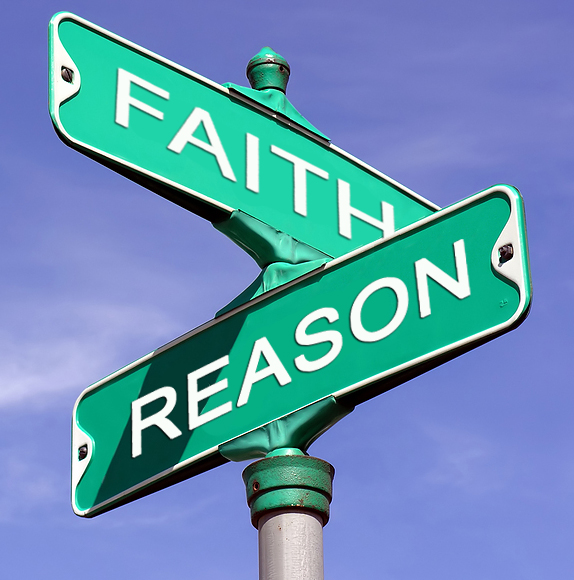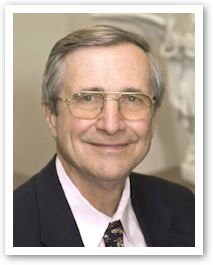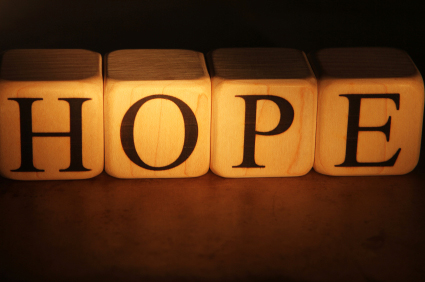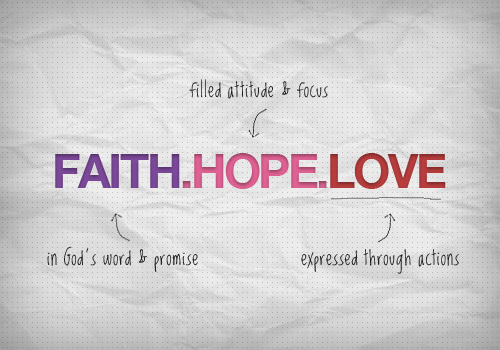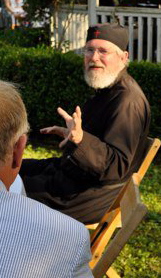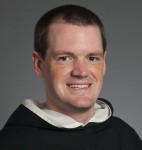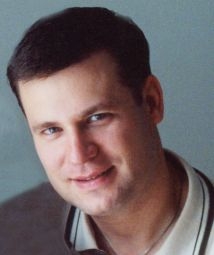
-by Carl Olson, Carl grew up in a Fundamentalist Protestant home and attended Briercrest Bible College, an Evangelical school in Saskatchewan, Canada. He and his wife, Heather, were married in 1994 and entered the Catholic Church together in 1997. Their conversion story appears in the book, Surprised By Truth 3 (Sophia Institute Press, 2002).
“Pope Benedict XVI dramatically underscored the importance of St. Augustine of Hippo (354-430) recently. In a series of general audiences dedicated to the Church fathers, Benedict devoted one or two audiences to luminaries such as St. Justin Martyr, St. Basil, and St. Jerome, while dedicating five to Augustine.
One of the greatest theologians and Doctors of the Church, Augustine’s influence on Pope Benedict is manifest. “When I read Saint Augustine’s writings,” the Holy Father stated in the second of those five audiences (January 16, 2008), “I do not get the impression that he is a man who died more or less 1,600 years ago; I feel he is like a man of today: a friend, a contemporary who speaks to me, who speaks to us with his fresh and timely faith.”
The relationship between faith and reason has a significant place in Augustine’s vast corpus. It has been discussed often by Benedict, who identifies it as a central concern for our time and presents Augustine as a guide to apprehending and appreciating more deeply the nature of the relationship. Augustine’s “entire intellectual and spiritual development,” Benedict stated in his third audience on the African Doctor (January 30, 2008), “is also a valid model today in the relationship between faith and reason, a subject not only for believers but for every person who seeks the truth, a central theme for the balance and destiny of all men.”
This is a key issue and theme in Augustine’s Confessions, his profound and influential account of his search for meaning and conversion to Christianity. Augustine testifies to how reason puts man on the road toward God and how it is faith that informs and elevates reason, taking it beyond its natural limitations while never being tyrannical or confining in any way. He summarized this seemingly paradoxical fact in the famous dictum, “I believe, in order to understand; and I understand, the better to believe” (Sermo 43:9).
Falsehoods about Faith
There are, as we all know, many distorted and shallow concepts of faith, reason, and the differences between the two. For self-described “brights” and other skeptics, reason is objective, scientific, and verifiable, while faith is subjective, personal, and irrational, even bordering on mania or madness. But if we believe that reason is indeed reasonable, it should be admitted this is a belief in itself, and thus requires some sort of faith. There is a certain step of faith required in putting all of one’s intellectual weight on the pedestal of reason. “Secularism,” posits philosopher Edward Feser in The Last Superstition: A Refutation of the New Atheism, “…can never truly rest on reason, but only “faith,” as secularists themselves understand that term (or rather misunderstand it, as we shall see): an unshakeable commitment grounded not in reason but rather in sheer willfulness, a deeply ingrained desire to want things to be a certain way regardless of whether the evidence shows they are that way.” (6)
For many people today the source of reason and object of faith is their own intellectual power. To look outside, or beyond, themselves for a greater source and object of faith is often dismissed as “irrational” or “superstitious.” As the Confessions readily document, Augustine had walked with sheer willfulness (to borrow Feser’s excellent descriptive) down this dark intellectual alleyway in his own life and found it to be a dead end. He discovered that belief is only as worthwhile as its object and as strong as its source. For Augustine—a man who had pursued philosophical arguments with intense fervor—both the object and source of faith is God.
“Belief, in fact” the Thomistic philosopher Etienne Gilson remarked inThe Christian Philosophy of Saint Augustine, “is simply thought accompanied by assent” (27). There is not and cannot be tension or conflict between reason and faith; they both flow from the same divine source. Reason should and must, therefore, play a central role in a man’s beliefs about ultimate things. In fact, it is by reason that we come to know and understand what faith and belief are. Reason is the vehicle, which, if driven correctly, takes us to the door of faith. As Augustine observed: “My greatest certainty was that “the invisible things of Thine from the creation of the world are clearly seen, being understood by the things that are made, even Thy eternal power and Godhead.” For when I inquired how it was that I could appreciate the beauty of bodies, both celestial and terrestrial; and what it was that supported me in making correct judgments about things mutable; and when I concluded, “This ought to be thus; this ought not”—then when I inquired how it was that I could make such judgments (since I did, in fact, make them), I realized that I had found the unchangeable and true eternity of Truth above my changeable mind.” (Confessions 7:17)
Getting through the door/portal of faith, porta fidei
However, while reason brings us to the threshold of faith, it seems, at least, implausible that ALL of Creation is a random incident/accident, and the fact that we are ignorant of how it comes to be is insufficient and irrational reasoning to deny the existence of the Divine, whereas accepting the proposal of the existence of the Divine seems rational, and refusal to do so due to ignorance, or what “fits” under a microscope, or can be understood by finite human reason —and even informs us that faith is a coherent and logical option—it cannot take us through the door. Part of the problem is that reason has been wounded by the Fall and dimmed by the effects of sin – human limitation, if you prefer. Reason is, to some degree or another, distorted, limited, and hindered; it is often pulled off the road by our whims, emotions, and passions.
But this is not why natural reason, ultimately, cannot open the door to faith. It is because faith is a gift from the Creator, Who is Himself inscrutable. In Augustine’s intense quest for God he asked: Can God be understood and known by reason alone? The answer is a clear, “No.” “If you understood Him,” Augustine declares, “it would not be God” (Sermo52:6, Sermo 117:3). The insufficiency of reason in the face of God and true doctrine is also addressed in the Confessions. Writing of an immature Christian who was ill-informed about doctrine, the bishop of Hippo noted: “When I hear of a Christian brother, ignorant of these things, or in error concerning them, I can tolerate his uninformed opinion; and I do not see that any lack of knowledge as to the form or nature of this material creation can do him much harm, as long as he does not hold a belief in anything which is unworthy of Thee, O Lord, the Creator of all. But if he thinks that his secular knowledge pertains to the essence of the doctrine of piety, or ventures to assert dogmatic opinions in matters in which he is ignorant—there lies the injury.” (Confessions 5:5)
Augustine’s high view of reason rested on his belief that God is the Author of all truth and reason. The Incarnate God-man, the second Person of the Trinity, appeals to man’s reason and invites him to seek more deeply, to reflect more thoroughly, and to thirst more intensely for the “eternal Truth”:
“Why is this, I ask of thee, O Lord my God? I see it after a fashion, but I do not know how to express it, unless I say that everything that begins to be and then ceases to be begins and ceases when it is known in Thy eternal reason that it ought to begin or cease—in Thy eternal reason where nothing begins or ceases. And this is Thy Word, which is also “the Beginning,” because it also speaks to us. Thus, in the Gospel, He spoke through the flesh; and this sounded in the outward ears of men so that it might be believed and sought for within, and so that it might be found in the eternal Truth, in which the good and only Master teacheth all his disciples. There, O Lord, I hear Thy voice, the voice of One speaking to me, since He Who teacheth us speaketh to us. (Confessions11:8)
Another example of Augustine’s high regard for reason and for its central place in his theological convictions is found in his experience with the teachings of Mani. As Augustine learned about the Manichaean view of the physical world, he became increasingly exasperated with its lack of logic and irrational nature. The breaking point came when he was ordered to believe teachings about the heavenly bodies that were in clear contradiction to logic and mathematics: “But still I was ordered to believe, even where the ideas did not correspond with—even when they contradicted—the rational theories established by mathematics and my own eyes, but were very different” (Confessions 5:3). And so Augustine left Manichaeanism in search of a reasonable, intellectually cogent faith.
Know the Limits
Reason, based in man’s finitude, cannot comprehend the infinite mysteries of faith, even while pointing towards them, however indistinctly. For Augustine this was especially true when it came to understanding Scripture. Early in his life, reading the Bible had frustrated and irritated him; later, graced with the eyes of faith, he was able to comprehend and embrace its riches: “Thus, since we are too weak by unaided reason to find out truth, and since, because of this, we need the authority of the holy writings, I had now begun to believe that thou wouldst not, under any circumstances, have given such eminent authority to those Scriptures throughout all lands if it had not been that through them thy will may be believed in and that thou might be sought. For, as to those passages in the Scripture which had heretofore appeared incongruous and offensive to me, now that I had heard several of them expounded reasonably, I could see that they were to be resolved by the mysteries of spiritual interpretation. The authority of Scripture seemed to me all the more revered and worthy of devout belief because, although it was visible for all to read, it reserved the full majesty of its secret wisdom within its spiritual profundity.” (Confessions 6:5)
The contrast between reading Scripture before and after faith is one Augustine returned to often, for it demonstrated how reason, for all of its goodness and worth, can only comprehend a certain circumscribed amount. While reason is a wonderful and even powerful tool, it is a natural tool providing limited results.
Man, the rational animal, is meant for divine communion, and therefore requires an infusion of divine life and aptitude. Grace, the divine life of God, fills man and gifts him with faith, hope, and love. Faith, then, is first and foremost a gift from God. It is not a natural virtue, but a theological virtue. Its goal is theosis —that is, participation in the divine nature (see CCC 460; 2 Pt 1:4). The Christian, reborn as a divinized being, lives by faith and not by sight, a phrase from St. Paul that Augustine repeated: “But even so, we still live by faith and not by sight, for we are saved by hope; but hope that is seen is not hope” (Confessions 13:13).
Recognize Rightful Authority
Humble receptivity to faith requires recognizing true and rightful authority. “For, just as among the authorities in human society, the greater authority is obeyed before the lesser, so also must God be above all” (Confessions 3:8). What Augustine could not find in Mani, he discovered in the person of Jesus Christ, His Church, and the Church’s teachings. All three are in evidence in the opening chords of theConfessions:
But “how shall they call on Him in whom they have not believed? Or how shall they believe without a preacher?” Now, “they shall praise the Lord who seek Him,” for “those who seek shall find Him,” and, finding Him, shall praise Him. I will seek Thee, O Lord, and call upon Thee. I call upon Thee, O Lord, in my faith which Thou hast given me, which Thou hast inspired in me through the humanity of Thy Son, and through the ministry of Thy preacher. (1:1)
For Augustine, there is no conflict between Christ, His Body, and His Word. Christ, through His Body, demonstrates the truthfulness of His Word, as Augustine readily admitted: “But I would not believe in the Gospel, had not the authority of the Catholic Church already moved me” (Contra epistolam Manichaei 5:6; see also Confessions 7:7). Holy Scripture, the Word of God put to paper by men inspired by the Holy Spirit, possesses a certitude and authority coming directly from its divine Author and protected by the Church:
Now whom but Thee, our God, didst make for us that firmament of the authority of Thy divine Scripture to be over us? For “the heaven shall be folded up like a scroll”; but now it is stretched over us like a skin. Thy divine Scripture is of more sublime authority now that those mortal men through whom Thou didst dispense it to us have departed this life. (Confessions13:15)
Humility and Harmony
“The harmony between faith and reason,” wrote Benedict XVI in his third audience on Augustine, “means above all that God is not remote; He is not far from our reason and life; He is close to every human being, close to our hearts and to our reason, if we truly set out on the journey.” Augustine’s life is a dramatic and inspiring witness to this tremendous truth, and it is why his Confessions continue to challenge and move readers today, 16 centuries after being written.
The young Augustine pursued reason, prestige, and pleasure with tremendous energy and refined focus, but could not find peace or satisfaction. It was when he followed reason to the door of faith, humbled himself before God, and gave himself over to Christ that he found Whom he was made by and for. “In its essence,” Gilson wrote, “Augustinian faith is both an adherence of the mind to supernatural truth and a humble surrender of the whole man to the grace of Christ” (The Christian Philosophy 31).
The Church Teaches
“Believing is possible only by grace and the interior helps of the Holy Spirit. But it is no less true that believing is an authentically human act. Trusting in God and cleaving to the truths He has revealed is contrary neither to human freedom nor to human reason.”
— Catechism of the Catholic Church 154
Love, Faith, and Hope,
Matthew

